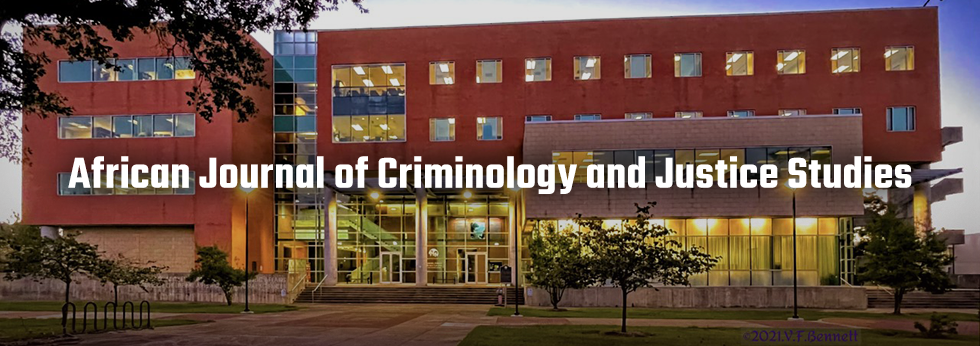Abstract
In this article, I intend to describe the history of terrorism, provide an explanation of some aspects of criminological theories related to the study of terrorism, and briefly articulate the link between criminology, terrorism, and homeland security. While criminology has made significant contributions in the understanding of crime in general, the literature on terrorism and homeland security by criminologists is still emerging. Arguably, this treatise calls for this void to be filled by criminologists, because terrorism and homeland security appropriately belong within the perimeters of criminology. This article employs the methodology of content analysis as used in social science research. It does not claim to settle all the budding and unsettled issues about criminology, terrorism, and homeland security today. The events of September 11, 2001 have proliferated different writings and theorizing about terrorism. Society has witnessed a surge in criminological interests in the area of the phenomenon of terrorism. However, prior to the tragedy of 2001, only some notable criminologists have examined the problem of terrorism (Georges-Abeyie 1980; White 1998; Smith 1994; Stohl 1988. While terrorism has been part of recorded humanity, and while it falls within the purview of criminology, academic criminology, prior to September 11, 2001, has not made the issue apposite to the components of criminology and criminal justice pedagogy. Today, scholars and social thinkers are awakened to focus on the phenomenon because terrorism can no longer escape criminological inquiry. Realizing this imperative theme, LaFree (2005) indicates recently that the literature on terrorism has significantly increased since the 1970s, but he insists that these studies have not been executed by criminologists or published in criminological journals. Indeed, terrorism has become such an irritant in the annals of governments and the academy that criminologists can no longer overlook it (Crenshaw 2001; 2003). As a result, many criminology programs are currently instituting and developing new courses on terrorism and homeland security. I firmly argue in this article that regardless of whether a distinction is made between terrorism and crime, terrorism, rooted in an ideology or not, should constitute an essential component of the discipline of criminology. After all, criminologists study white-collar crimes (Sutherland 1983), state crimes (Ross 2000; 2003), environmental crimes (Lynch et al. 2004a), the classics of American criminology (Gabbidon 1999b; Taylor-Greene and Gabbidon 2000; Young and Taylor-Greene 1995), counter-colonial criminology (Agozino 2003) and crimes of violence, such as serial and mass murders (Jenkins 1988). In order for criminology to make contributions to the knowledge of terrorism, the discipline ought to incorporate terrorism as part of the criminological enterprise. Although I will examine the important issue of homeland security and its connections to terrorism, I must first review the history of terrorism and the criminological theories that have been relevant in the understanding of terrorism and its deadly impact on society. This is important because with no theories as guides, then research might be conducted haphazardly and policies would have less credibility. However, before one can adequately articulate and formulate new ideas about the occurrence of terrorism, he or she must be sufficiently knowledgeable about its history. Additionally, a comprehension and application of the existing theoretical perspectives in the discipline necessitates—and augments—new dimensions and proper areas of explorations and theoretical rationalizations. It is important that criminologists develop theories that will explain terrorism. The good news is that some scholars have been avidly tackling the issue (see Crenshaw 2001; 2003; Mueller 2002; Abrams 2003; Rudasil and Moyer 2004; Weinzierl 2004; Gurr 1970; 1988; Onwudiwe 2001), utilizing different theoretical and methodological approaches.
Recommended Citation
Onwudiwe, Ihekwoaba D.
(2007)
"The Place Of Criminology In The Study Of Terrorism: Implications For Homeland Security,"
African Journal of Criminology and Justice Studies: Vol. 3:
Iss.
1, Article 3.
Available at:
https://digitalscholarship.tsu.edu/ajcjs/vol3/iss1/3
Included in
Political Science Commons, Public Affairs, Public Policy and Public Administration Commons


